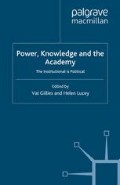Abstract
This is our first collaborative writing together even though our ‘we’ voice might suggest that we have previously belonged to the same research teams. We use ‘we’ as a device in this chapter to describe the range of our teamwork experiences in an anonymous way. We write from a position of feeling marginal inside academic institutions, even though we are surrounded by female, often ‘feminist’, colleagues (Reay 2000; Morley 1999). In common with other feminist academics, we feel more acknowledged and valued as researchers outside our institutions than within them. Partly, we realise this is linked to different discourses of performativity that dominate in specific settings.
Access this chapter
Tax calculation will be finalised at checkout
Purchases are for personal use only
Preview
Unable to display preview. Download preview PDF.
References
Bell, L. and Nutt, L.(2002) Divided loyalties, divided expectations: research ethics, professional and occupational responsibilities, in Mauthner, M., Birch, M., Jessop, J. and Miller, T.(eds), Ethics in Qualitative Research, London: Sage.
David, M.(2004) A feminist critique of public policy discourses about educational effectiveness, in Ali, S., Benjamin, S. and Mauthner, M.(eds), The Politics of Gender and Education: Critical Perspectives, Basingstoke: Palgrave.
Deem, R.(2002) Talking to university managers–methodological dilemmas and feminist research strategies, Sociology 36(4) 835–855.
Deem, R.(2004) Gender, organisational cultures and the practices of manager-academics in UK Universities, Gender, Work and Organisation, 10(2) 239–259.
Evans, M.(2005a) Killing Thinking: Death of the University, London/New York: Continuum International Publishing Group.
Evans, M.(2005b) Too bad, ‘good girl’, The Times Higher Education, 22 July.
Ford, H. & Harding, N.(2005) We went looking for the organisation but could find only the metaphysics of its presence, Sociology 38(4) 815–830.
Hey, V.(2001) The construction of academic time: sub/contracting academic labour in research, Journal of Education Policy, 16(1) 67–84.
Holland, J., Ramazanoglu, C., Sharpe, S. and Thomson, R.(with Rhodes, T.)(1998) The Male in the Head: Heterosexuality and Power, London: Tufnell Press.
hooks, b.(1996) Sisterhood, in Penny Weiss and Marilyn Friedman(eds), Feminism and Community, Philadelphia: Temple University Press.
Maddox, B.(2003) Rosalind Franklin: The Dark Lady of DNA, Glasgow: HarperCollins.
Mauthner, M.(2002) Sistering: Power and Change in Female Relationships, Basingstoke: Palgrave.
Morley, L.(1999) Organising Feminisms. The Micropolitics of the Academy, New York: St Martins Press.
Morley, L.(2003) Quality and Power in Higher Education, Buckingham: Open SRHE and University Press.
Oakley, A.(1995) Women and children first and last: parallels and differences between children’s and women’s studies, in B. Mayall(ed.), Children’s Childhoods, Sussex: Falmer Press, pp. 13–32.
O’Leary, V. and Mitchell, J.(1990) Women connecting with women: networks and mentors, in S.S. Lie and V. O’Leary(eds), Storming the Tower: Women in the Academic World, London: Kogan Page.
Reay, D.(2000) ‘Dim dross’: marginalised women both inside and outside the academy’, Women’s Studies International Forum, 23(1) 13–21.
Sagaria, M.A.D. and Rychener, M.A.(2004) Inside leadership circles and the managerial quagmire: key influences on women administrators’ mobility and opportunity in US Higher Education, in Ali, S., Benjamin, S. and Mauthner, M.(eds), The Politics of Gender and Education: Critical Perspectives, Palgrave: Basingstoke.
Trowler, P.(2001) Captured by the discourse? The socially constitutive power of new higher education discourse in the UK, Organization, 8(2) 183–202.
Weedon, C.(1987) Feminist Practice and Poststructuralist Theory, Oxford: Blackwell.
Editor information
Editors and Affiliations
Copyright information
© 2007 Melanie Mauthner and Linda Bell
About this chapter
Cite this chapter
Mauthner, M., Bell, L. (2007). Power Relationships in Research Teams. In: Gillies, V., Lucey, H. (eds) Power, Knowledge and the Academy. Palgrave Macmillan, London. https://doi.org/10.1057/9780230287013_6
Download citation
DOI: https://doi.org/10.1057/9780230287013_6
Publisher Name: Palgrave Macmillan, London
Print ISBN: 978-1-349-54676-3
Online ISBN: 978-0-230-28701-3
eBook Packages: Palgrave Social & Cultural Studies CollectionSocial Sciences (R0)

